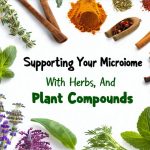The intricate relationship between our diet, gut microbiome, and overall health is increasingly recognized as fundamental to well-being. For decades, nutritional science focused heavily on macronutrients – proteins, carbohydrates, and fats – but now attention is shifting towards the power of micronutrients and, more specifically, plant compounds called polyphenols. These naturally occurring molecules aren’t essential for immediate survival in the same way macronutrients are, yet they exert profound influences on our physiological processes, particularly concerning gut health and inflammation. Understanding how polyphenols interact with our gut bacteria and modulate inflammatory responses offers exciting possibilities for preventative healthcare and improved quality of life.
Polyphenols are not readily absorbed in the upper gastrointestinal tract; this is a crucial point. This limited absorption isn’t a flaw but rather part of their functionality. Because they reach the colon largely intact, they become available to the diverse community of microorganisms residing there – our gut microbiome. These bacteria possess enzymes capable of breaking down complex polyphenols into smaller, absorbable compounds, effectively unlocking their health benefits and simultaneously nourishing the beneficial bacterial populations. This symbiotic relationship is at the heart of polyphenol’s impact on both gut health and systemic inflammation. It’s a testament to how interwoven our biology truly is – we are not simply what we eat, but also what our gut bacteria make from what we eat.
Polyphenols & The Gut Microbiome: A Symbiotic Dance
The composition of the gut microbiome is highly individual, influenced by genetics, environment, and especially diet. A healthy gut microbiome is characterized by diversity – a wide range of bacterial species coexisting in balance. Polyphenols don’t just randomly affect bacteria; they selectively promote the growth of beneficial microbes while potentially inhibiting harmful ones. This selective pressure helps shift the microbial landscape towards a more favorable state. Specifically, polyphenols have been shown to increase populations of Bifidobacteria and Lactobacilli, well-known probiotics associated with improved digestion, immune function, and reduced inflammation.
This process is not one-way; the gut bacteria reciprocate the favor. As they metabolize polyphenols, they produce beneficial metabolites like short-chain fatty acids (SCFAs) – acetate, propionate, and butyrate. Butyrate, in particular, is a vital energy source for colonocytes (cells lining the colon), strengthening the gut barrier and reducing intestinal permeability – often called “leaky gut.” A compromised gut barrier allows unwanted substances to enter the bloodstream, triggering immune responses and systemic inflammation. The bacterial breakdown of polyphenols therefore indirectly fortifies this crucial barrier function. Understanding how gut movement impacts these processes is also key to maintaining gut health.
The diversity of polyphenols themselves plays a role in microbiome modulation. Different polyphenols favor different bacteria, highlighting the importance of consuming a wide variety of polyphenol-rich foods. For example, ellagic acid found in berries may promote different bacterial growth compared to catechins from green tea. This underscores that simply taking a single polyphenol supplement won’t replicate the benefits of a diverse diet rich in plant compounds. Understanding gut inflammation is also important when considering dietary choices.
Polyphenol Sources & Bioavailability
Identifying and incorporating polyphenol-rich foods into one’s diet is relatively straightforward, though understanding bioavailability – how well these compounds are absorbed and utilized – is more complex. Excellent sources include:
– Berries (blueberries, raspberries, strawberries)
– Dark chocolate (with high cocoa content)
– Green tea
– Red wine (in moderation, if consumed)
– Apples
– Onions
– Olive oil
However, the amount of polyphenols actually absorbed varies significantly based on several factors. Food processing methods can reduce polyphenol content; for instance, excessive heat or prolonged storage can degrade these compounds. Individual gut microbiome composition also influences bioavailability – people with different microbial profiles will metabolize polyphenols differently. Furthermore, combining polyphenols with fats can sometimes enhance absorption, while fiber intake can influence their transit time through the digestive system. Fiber’s role in supporting a healthy microbiome is crucial for optimal polyphenol metabolism.
It’s important to note that bioavailability isn’t necessarily synonymous with efficacy. As mentioned earlier, the majority of polyphenols don’t need to be directly absorbed to exert benefits; their impact on the gut microbiome is often more significant than their systemic absorption. This challenges the conventional focus on maximizing bioavailability and highlights the importance of understanding the complex interactions within the gut ecosystem. The role of gut bacteria in this process cannot be overstated.
The Gut-Brain Connection & Polyphenols
The influence of polyphenols extends beyond gut health, impacting brain function through what’s known as the gut-brain axis. This bidirectional communication pathway links the digestive system to the central nervous system. The microbiome plays a crucial role in this connection, influencing neurotransmitter production and immune signaling that can affect mood, cognition, and even behavior.
Polyphenol-induced changes in gut microbiota composition can modulate these pathways. For instance, SCFAs produced during polyphenol metabolism have been shown to cross the blood-brain barrier and directly influence brain function. Butyrate, for example, possesses neuroprotective properties and may enhance cognitive performance. Furthermore, a healthier gut microbiome, fostered by polyphenols, is associated with reduced levels of inflammation throughout the body, including the brain. Chronic inflammation is increasingly recognized as a contributing factor to neurological disorders like depression and anxiety.
Research suggests that polyphenol consumption could potentially improve mood, reduce stress responses, and enhance cognitive function through these mechanisms. While more research is needed to fully understand these complex interactions, it highlights the far-reaching implications of supporting gut health with a polyphenol-rich diet. Understanding gut-brain axis is vital for holistic wellbeing.
Polyphenols & Inflammation: A Multi-faceted Approach
Inflammation is a natural bodily response to injury or infection, but chronic inflammation underlies many chronic diseases, including heart disease, cancer, and autoimmune disorders. Polyphenols combat inflammation through multiple mechanisms beyond their impact on the gut microbiome. They directly inhibit inflammatory pathways within cells, acting as antioxidants to neutralize free radicals that contribute to oxidative stress – a key driver of inflammation.
Specifically, polyphenols can interfere with the production of pro-inflammatory cytokines (signaling molecules) and modulate the activity of enzymes involved in the inflammatory response. For example, resveratrol found in grapes and red wine has demonstrated anti-inflammatory effects by inhibiting NF-κB, a master regulator of inflammation. However, it’s important to reiterate that these direct anti-inflammatory effects are often secondary to their influence on gut health.
A healthier gut microbiome, nurtured by polyphenols, strengthens the immune system’s ability to distinguish between harmless and harmful stimuli. This reduces the likelihood of an overactive immune response – a hallmark of chronic inflammation. The SCFAs produced during polyphenol metabolism also play a role in regulating immune cell function, promoting tolerance and reducing inflammatory responses. Essentially, polyphenols offer a multi-faceted approach to managing inflammation, addressing both its root causes within the gut and its downstream effects throughout the body. Considering fasting as a tool for digestive balance can further support these efforts.


















